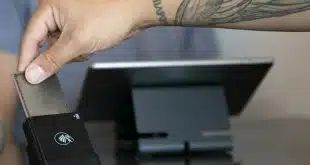Selling merchants solely on the price and availability of a diverse set of payment processing methods won’t be enough in the next year or so as merchants increasingly turn to those who can help them grow their businesses.
That’s the message proponents of mobile marketing and advertising services are touting at Transact 14, the annual conference of the Electronic Transactions Association, held this year in Las Vegas. Merchants want ways to help grow their businesses, and mobile commerce service could do that.
Yowza, a mobile marketing brand backed by Spindle Inc., a Scottsdale, Ariz.-based company, has launched its reseller program for Yowza, Bill Clark, Spindle chief executive, tells Digital Transactions News. Resellers receive a fee for each merchant they sign up, as much as $200, Clark says. Merchants can pay $99 per month for the marketing and platform technology licenses, or $49 for the marketing and $59 for the platform, if sold separately. Merchants with multiple outlets have a different fee structure.
Yowza provides merchants with a way to present mobile coupons and offers to consumers on their smart phones. Currently, about 95,000 merchant locations are enrolled in Yowza, Clark says, with nearly 2 million downloads of the app that consumers use. Yowza also is nearing debut of a mobile wallet to store credit cards, he says.
That will provide Yowza with a payment mechanism that consumers can use at the point of sale, Clark says. To pay via mobile, the merchant presses the mobile tender key on the POS system, which pulls a Quick Response code from the Yowza server to display to the consumer. The consumer opens the Yowza wallet and selects a payment card, then scans the QR code to make the payment.
Yowza will need to build a database for merchants to use to create Yowza mobile offers, Clark says. “It’s not just collection data, but collecting considerable data points,” Clark says.
Building apps and creating reseller programs is just one aspect of mobile commerce. Another critical element is ensuring merchants can and want to participate. “The idea is to receive a coupon and use your mobile phone to make a purchase,” Clark says. “We built an ecosystem to make it easier.”
Loop, a Boston-based mobile payment company, also is offers a mobile payment service that uses magnetic induction to make a contactless connection an magnetic-stripe reader without requiring the merchant to install any new equipment. Instead, the consumer stores payment cards in the Loop wallet app. She then selects a card to pay with, and holds the Loop fob or phone case near the mag-stripe reader to generate a magnetic induction field between the two devices.
The card reader interprets that connection as a card present transaction, and sends it out for authorization.
“We’re helping the incumbents by looking at providing the Loop wallet as a channel and do marketing deals in it,” says Will Graylin, Loop chief executive. “Merchants are willing to pay for that.”
The way to get to these merchants is through independent sales organizations and acquirers, says Henry Helgeson, chief executive of Merchant Warehouse, a Boston-based payment-services company. “The way to accelerate adoption is through the ISO, which can drop directly onto the merchant countertop,” Helgeson says. That’s because the ISO has the merchant connection.
There are two ways mobile commerce companies can choose to find merchants. One is to incorporate the existing ISO and acquirer sales channel, or via direct distribution, Helgeson says. Those choosing solely a direct distribution model may find more challenges reaching merchants, he says.
His reasoning is that some entity has to connect the mobile offer capability to the existing point-of-sale system, a relationship that ISOs and acquirers already have. “Doing direct distribution without integration can be very challenging,” Helgeson says.
Total Merchant Services, a Woodland Hills, Calif.-based merchant services company, realized that when it developed Groovv, its newly-launched tablet-based POS system that includes mobile offers. Groovv, developed in-house, used technology from Fanminder, a social and mobile marketing tool TMS developed.
Groovv represents a way to have a different conversation with merchants, one that isn’t centered on price, but ways to help them grow their businesses, says Shelley Plomske, vice president of product. Merchants can choose from a tablet POS systems, a cash register with a touchscreen interface and a card reader to attach to smart phones.
Merchants control not only the inventory and pricing, but the marketing messages and their frequencies of delivery, Plomske says. Messages can be sent via as many as five channels, including email, text, Facebook, Twitter and on the merchant’s own Web site, she says. “Merchants can customize their offers as much or as little as they want,” Plomske says.
TMS is offering Groovv with an undisclosed buy rate, which a reseller could mark up as they want, she says. There is no cost for the equipment for resellers.





